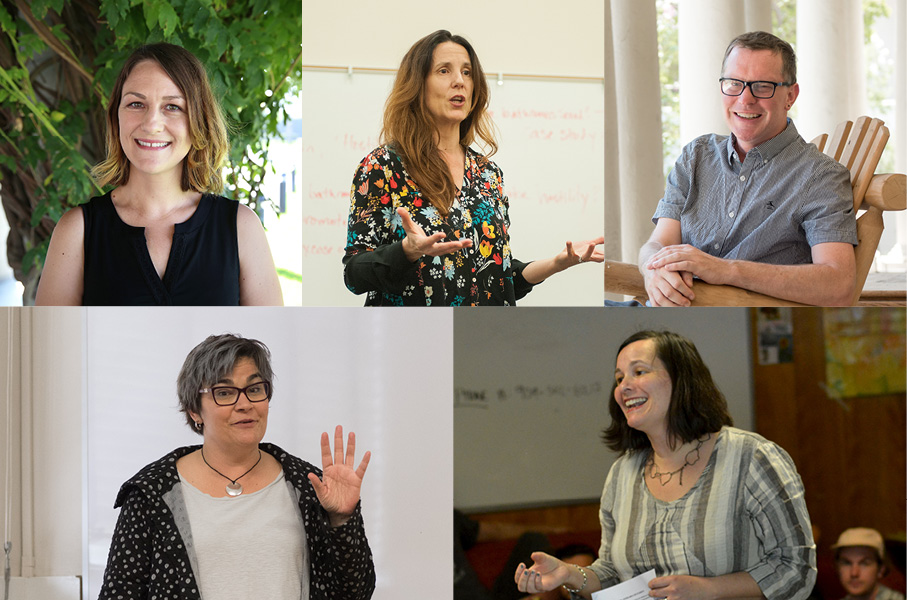During the last week of February, five University of Redlands faculty members in the humanities or social sciences “took over” Inside Higher Ed’s Academic Minute, highlighting their new projects during the two-and-a-half-minute podcast.
On Monday, Jessie Hewitt, professor of history, brought a historical context to issues of madness and marriage in her podcast, “Men, Madness, and Marriage in 19th-Century France.” She begins:
“The nineteenth-century psychiatric system calls to mind images of injustice and dread, particularly with respect to the internment of women deemed insane. Women who loved other women, women who chose not to marry, and women who rejected motherhood could all find themselves committed to asylums against their wills. Yet, in nineteenth-century France, men also faced institutionalization if they failed to live up to popular conceptions of what it meant to be a good husband and father. One such man was Auguste Faulte du Puyparlier, an aging veteran of France’s conquest of Algeria who woke up in the Parisian asylum Charenton in 1869.”
On Tuesday, Jennifer Nelson, professor of women, gender, and sexuality studies, spoke to how the pandemic brought longstanding ties between health and social inequalities to the fore in her podcast, “Inequality and Healthcare.” She says:
“The present global pandemic has made apparent that historical links between inequality and healthcare persist. According to the CDC, compared to White Americans, Black Americans have been nearly 5 times more likely to be hospitalized because of COVID-19 and have been two times more likely to die. Many experts attribute these disparities to unequal healthcare access. Civil Rights movement activists, over a generation ago, addressed racial disparities in healthcare by fighting for public clinics that would involve the community in-clinic services. My research has focused on the Delta Health Center in Mound Bayou, Mississippi where one of the first federal demonstration projects was founded in 1966. The poor provided and managed much of their own healthcare and health workers were drawn from the local population.”
On Wednesday, Tim Seiber, professor of science and media studies, spoke to how more powerful brain scans can lead to changes in declarations of brain death in “Pictures on the Threshold between the Living and the Dead.” He notes:
“While brain images from drawings to photographs have a long history, it was not until the mid-1980s that scans of living brains could show structure and function in a medically useful way. Today, these scans are being asked to detect and depict less-than-fully-conscious brain states including brain death. Brain death is a fraught medical, political, and cultural subject bound up with the organ donation system, religious values, the law, and bioethics. First published in 1968, diagnostic standards for determining brain death were behavioral: a person could be declared brain dead if they did not respond to stimuli, breath without a respirator, exhibit reflexes, or show electrical activity.”
On Thursday, Kathy Feeley, associate dean, professor of history, director of the Proudian Interdisciplinary Honors Program, described how one group of women journalists responded to questions about their legitimacy in “The Rise of the Hollywood Press Corps and the Making of the Modern American Press.” She says:
“In this project, I center the Hollywood Women’s Press Club (HWPC) to examine the dramatic ascendance, significant impact, and enduring significance of mid-twentieth-century American entertainment journalism from the 1920s to the 1980s. The Hollywood press corps—as a professional cohort and cultural concept—does not exist in 1920 but emerges as the third-largest U.S. press corps by 1950. The networks, output, and decidedly mixed cultural reception of the white, female journalists and public relations personnel of the Hollywood Women’s Press Club shaped critical debates over the meaning of American journalism and issues of work, marriage, children, sexual harassment, and likeability in American women’s lives.”
On Friday, Kelly Hankin, professor of film studies, discussed a new trend in the study abroad industry in “The Personal is Professional: The Study Abroad Video Contest.” Hankin states:
“In the last decade, the “study abroad video contest” has become a ubiquitous feature of the study abroad industry. Numerous stakeholders—from vendors to universities—now regularly promote video contests and showcase award winning visions of student travel through officially sponsored websites. My research of these contests—their rhetoric, submission directives, and winning videos—demonstrates how, as a result of the study abroad industry’s reliance on students’ free labor without a concomitant attention to their media literacy, student filmmakers and the industry unwittingly collaborate in the production of a study abroad gaze that belies institutional rhetoric and aspirational goals.”
Listen to the full podcasts, which are available on Academic Minute, or learn more about studying history; women, gender, and sexuality studies; health, medicine, and society; media and visual culture studies; or the Johnston Center for Integrative Studies at the U of R.






